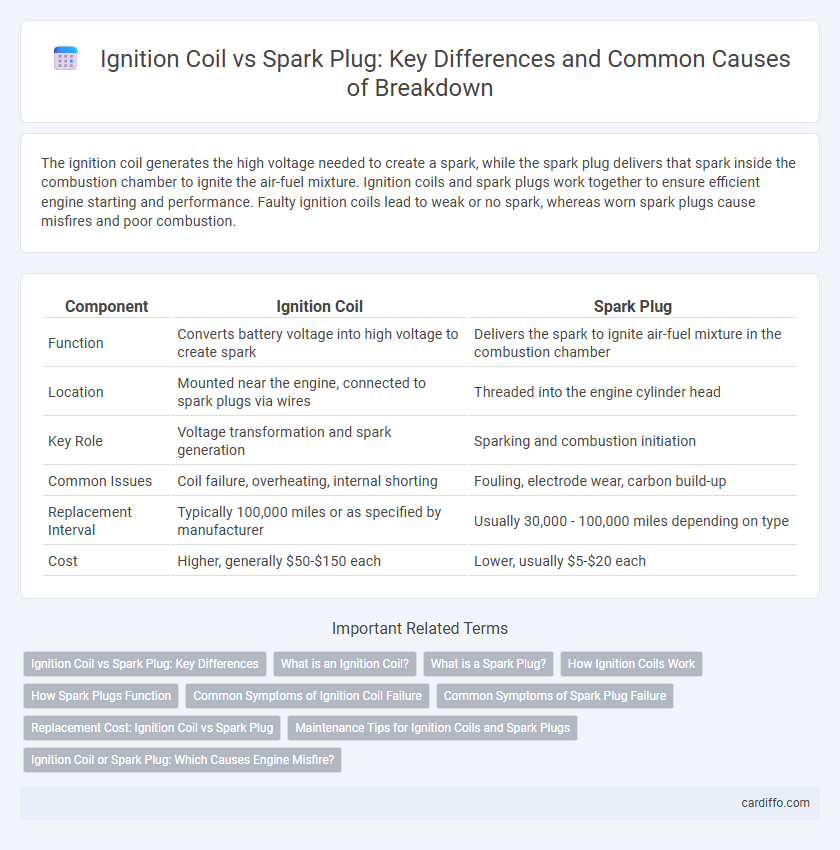The ignition coil generates the high voltage needed to create a spark, while the spark plug delivers that spark inside the combustion chamber to ignite the air-fuel mixture. Ignition coils and spark plugs work together to ensure efficient engine starting and performance. Faulty ignition coils lead to weak or no spark, whereas worn spark plugs cause misfires and poor combustion.
Table of Comparison
| Component | Ignition Coil | Spark Plug |
|---|---|---|
| Function | Converts battery voltage into high voltage to create spark | Delivers the spark to ignite air-fuel mixture in the combustion chamber |
| Location | Mounted near the engine, connected to spark plugs via wires | Threaded into the engine cylinder head |
| Key Role | Voltage transformation and spark generation | Sparking and combustion initiation |
| Common Issues | Coil failure, overheating, internal shorting | Fouling, electrode wear, carbon build-up |
| Replacement Interval | Typically 100,000 miles or as specified by manufacturer | Usually 30,000 - 100,000 miles depending on type |
| Cost | Higher, generally $50-$150 each | Lower, usually $5-$20 each |
Ignition Coil vs Spark Plug: Key Differences
Ignition coils convert battery voltage into the high voltage needed to create a spark at the spark plug, enabling engine combustion. Spark plugs deliver this spark inside the engine's combustion chamber, igniting the air-fuel mixture for power generation. Understanding the distinction between ignition coils and spark plugs is essential for diagnosing engine performance issues and ensuring proper vehicle maintenance.
What is an Ignition Coil?
An ignition coil is an essential component in a vehicle's ignition system responsible for converting the low voltage from the battery into the high voltage needed to create a spark at the spark plug. This high voltage spark ignites the air-fuel mixture within the engine's combustion chamber, enabling the engine to start and run efficiently. Ignition coils are critical for maintaining proper engine performance and fuel efficiency.
What is a Spark Plug?
A spark plug is a crucial component of an internal combustion engine that delivers electric current from the ignition system to ignite the air-fuel mixture in the engine's cylinders. It features a central electrode and a ground electrode separated by a gap, where the spark is generated to initiate combustion. Proper functioning of the spark plug ensures efficient engine performance, fuel economy, and reduced emissions.
How Ignition Coils Work
Ignition coils function by transforming the battery's low voltage into the high voltage needed to create a spark in the spark plugs, which ignites the air-fuel mixture in an engine's combustion chamber. Each coil consists of primary and secondary windings that use electromagnetic induction to boost voltage from around 12 volts to as high as 40,000 volts or more. Proper operation of ignition coils is crucial for efficient engine performance and preventing breakdowns related to faulty spark generation.
How Spark Plugs Function
Spark plugs generate a high-voltage electric spark that ignites the air-fuel mixture inside an engine's combustion chamber. The ignition coil transforms the battery's low voltage into the thousands of volts needed for this spark. Effective combustion depends on the spark plug's precise gap and clean electrodes, which ensure consistent ignition and optimal engine performance.
Common Symptoms of Ignition Coil Failure
Common symptoms of ignition coil failure include engine misfires, rough idling, and difficulty starting the vehicle. A failing ignition coil often triggers the check engine light and causes reduced fuel efficiency due to incomplete combustion. Vehicle hesitation during acceleration and increased exhaust emissions are also indicative of ignition coil issues.
Common Symptoms of Spark Plug Failure
Misfiring engine, rough idling, and reduced fuel efficiency are common symptoms of spark plug failure. Incomplete combustion caused by worn or fouled spark plugs leads to engine hesitation during acceleration. Ignition coil issues primarily cause weak or no spark, while spark plug failure often results in visible carbon deposits or electrode damage.
Replacement Cost: Ignition Coil vs Spark Plug
Replacement cost for ignition coils generally ranges between $50 and $150 per unit, reflecting their more complex design and critical role in the engine's ignition system. Spark plugs are significantly cheaper, typically costing $10 to $30 each, with easier installation and more frequent replacement intervals. Factoring labor, ignition coil replacement can total $150 to $300, while spark plug replacement usually falls between $40 and $100, making spark plugs a more economical and routine maintenance expense.
Maintenance Tips for Ignition Coils and Spark Plugs
Regular inspection and timely replacement of ignition coils and spark plugs prevent engine misfires and ensure optimal combustion efficiency. Cleaning spark plugs to remove carbon deposits and using dielectric grease on ignition coil boots enhance electrical conductivity and durability. Maintaining proper gap settings on spark plugs and checking ignition coil resistance with a multimeter are crucial for sustained engine performance and fuel economy.
Ignition Coil or Spark Plug: Which Causes Engine Misfire?
Engine misfires are often caused by a faulty ignition coil or spark plug, but ignition coils are more commonly responsible due to their role in generating the high voltage needed for spark plugs to ignite the air-fuel mixture. A failing ignition coil can lead to weak or inconsistent sparks, resulting in incomplete combustion and misfires. Spark plugs also contribute to misfires when worn or fouled, but ignition coil issues typically have a more significant impact on engine performance.
Ignition coil vs spark plug Infographic

 cardiffo.com
cardiffo.com